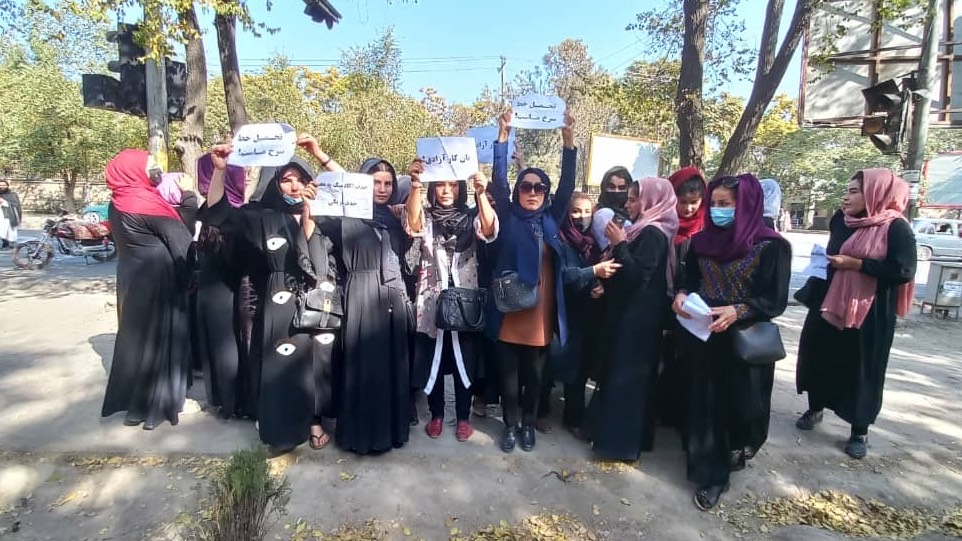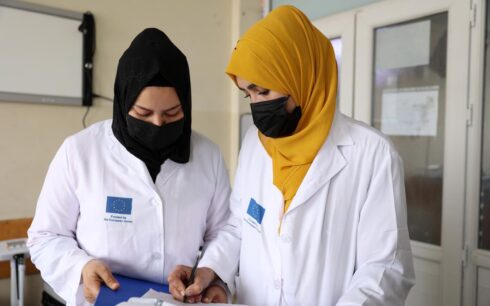Three Afghan women detained for protesting against Taliban abuses described torture and other severe mistreatment while in custody, Human Rights Watch (HRW) said Thursday.
The women said they were wrongfully detained with their families, including small children.
According to the watchdog, the women experienced threats, beatings, dangerous conditions of confinement, denial of due process, abusive conditions of release, and other abuses.
HRW reported the Taliban authorities assaulted and administered electric shocks to detained male relatives and that the women’s description of their experience sheds light on the Taliban’s treatment of women protesters in custody and the Taliban’s efforts to silence the protest movement.
“It’s difficult to overstate the incredible bravery of these and other Afghan women who protest against Taliban abuses,” said Heather Barr, associate women’s rights director at Human Rights Watch.
Barr said the women’s stories show how deeply threatened the Taliban feel by their activities, and the brutal lengths the Taliban go to try to silence them.
According to the watchdog, the Taliban had arbitrarily arrested the three women during a single raid on a safe house in Kabul in February this year.
The Taliban authorities held them and their family members for several weeks at the Interior Ministry in apparent retaliation for their involvement in planning and participating in women’s rights protests.
After their release, the women and their families fled the country.
The Taliban has systematically rolled back the rights of women and girls since taking control of Afghanistan on August 15 last year.
Brutal response to protests
Soon after the Taliban takeover, women started protesting across the country. However the Taliban’s response was brutal from the beginning.
Human Rights Watch reported that over time, the Taliban’s abusive responses escalated, with a particularly harsh response to a protest on January 16 in Kabul, when Taliban members threatened, intimidated, and physically assaulted protesters, using pepper spray and electric shock devices.
Days later, the Taliban began conducting raids to arbitrarily detain women who had participated in protests.
Tamana Paryani, one of the first protesters to be arbitrarily detained under Taliban rule, filmed herself as the Taliban broke into her home at night searching for her, and then quickly posted the video on social media.
The women interviewed said that Paryani’s abduction sent waves of fear through other protesters, causing many to go into hiding.
Taliban forcibly coerced confessions
Human Rights Watch stated that the three women interviewed described being held initially in a single cramped and stiflingly hot room with a total of 21 women and 7 children for five days, provided virtually no food or water or access to a toilet.
They said the Taliban held them for several weeks, and abusively interrogated them, without allowing access to counsel or other due process rights, forcibly coerced confessions, and severely tortured the men.
In addition, the Taliban compelled the three women’s families to hand over the original deeds to their property as the price for release, with the threat that the Taliban would confiscate the property if the women got into trouble again, the watchdog reported.
Human Rights Watch has in turn stated the Taliban should immediately release everyone detained for exercising their rights to free speech and peaceful protest.
“They should respect the rights of all to peaceful assembly and free expression, including journalists covering protests. They should end all arbitrary detention, ensure due process, including promptly charging suspects in custody before an independent judge, and providing immediate access to counsel,” the report read.
In addition, the Taliban should hold lawfully detained individuals in accordance with the UN Standard Minimum Rules for the Treatment of Prisoners, HRW stated adding that anyone responsible for torture or other ill-treatment should be impartially investigated and appropriately prosecuted.
The watchdog noted that governments should increase refugee resettlement places for Afghans and give priority to resettling women’s rights defenders who are at particular risk because of ongoing activism.
“The governments should also establish and maintain generous complementary pathways for safe, legal, and orderly migration,” the report read.
In conclusion, Barr said: “Afghan women and girls have faced some of the harshest consequences of Taliban rule, and they have led the difficult fight to protect rights in Afghanistan.
“Unfortunately, their pleas to the international community to stand by them have not been answered.”





